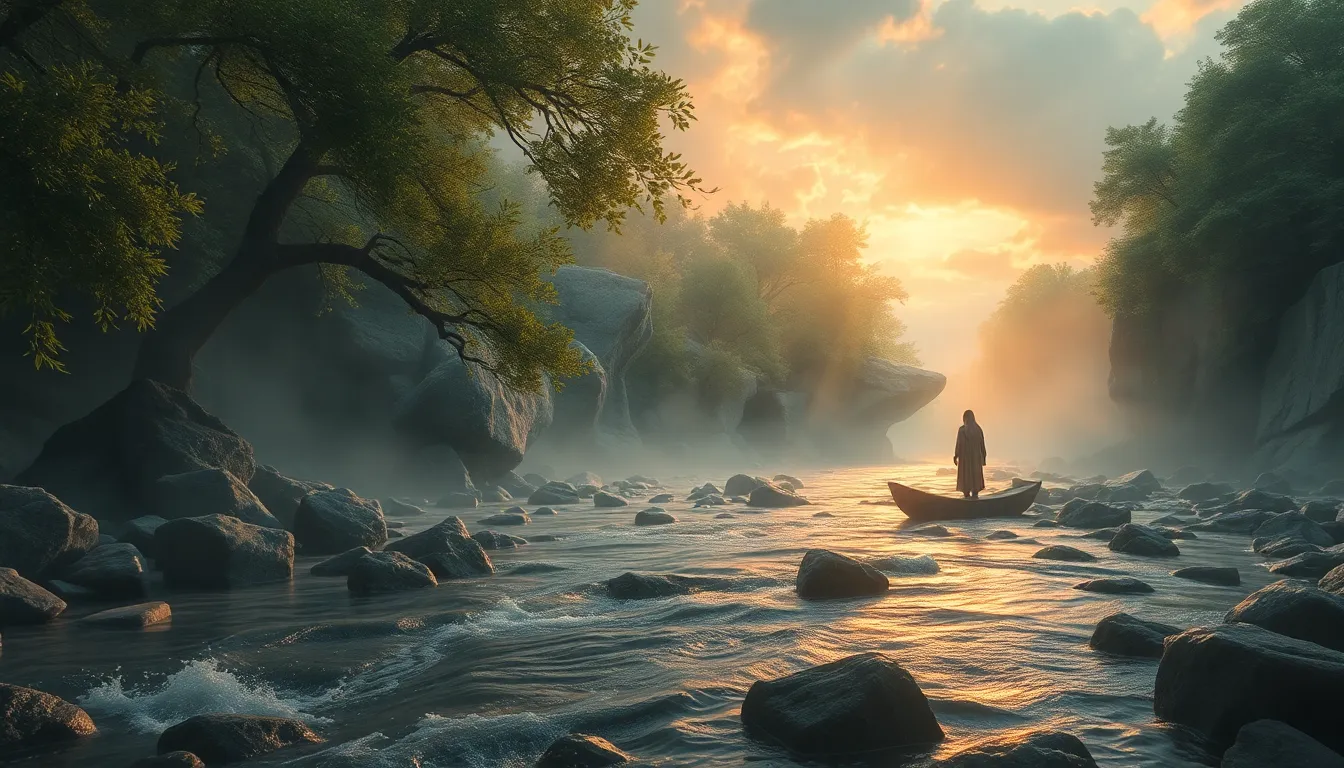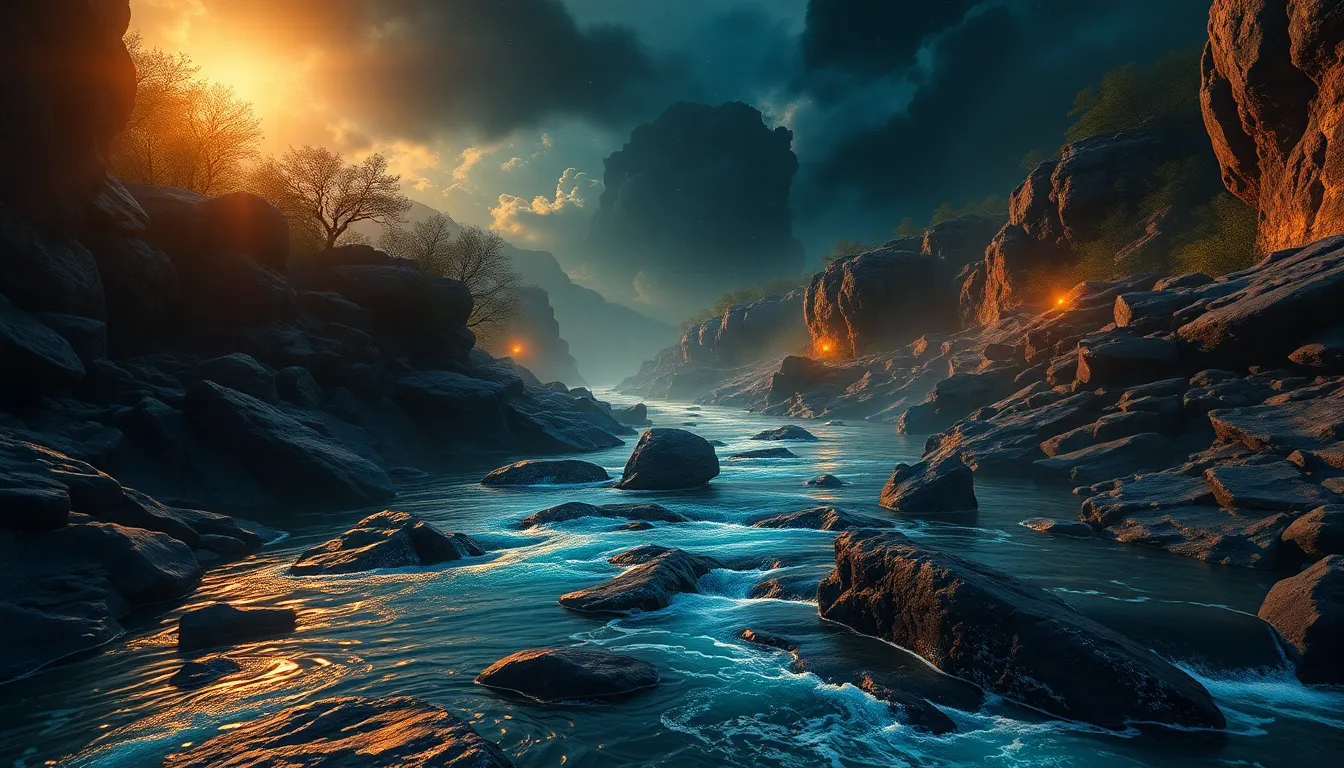The River of the Wise: Myths of Knowledge Seekers
I. Introduction to the River of the Wise
The River of the Wise is a powerful metaphorical concept found in various cultures throughout history, representing the pursuit of knowledge and wisdom. This river is often depicted as a mystical body of water that flows through the landscape of human experience, inviting seekers to embark on a journey toward enlightenment.
Myths surrounding the River of the Wise are significant in knowledge-seeking cultures, as they encapsulate the values, beliefs, and aspirations of societies striving for understanding and enlightenment. These myths often serve as guiding narratives that illustrate the trials and triumphs of those who seek wisdom.
This article will explore the origins of the River myth, the archetype of the knowledge seeker, the pathways to knowledge, the guardians of the river, the role of nature in knowledge myths, the transformation of the seeker, modern interpretations, and the lessons that can be drawn for contemporary knowledge seekers.
II. Origins of the River Myth
The origins of the River of the Wise can be traced back to ancient civilizations where knowledge was revered and sought after. In cultures such as the Egyptians, Greeks, and Indigenous peoples, rivers often symbolized life, fertility, and the flow of information.
The River serves as a universal symbol of wisdom, flowing through various cultures with different interpretations. For example:
- In Ancient Egypt: The Nile was considered a divine gift, a source of life that provided knowledge and sustenance.
- In Greek mythology: The River Lethe represented forgetfulness, contrasting with the River Mnemosyne, which symbolized memory and wisdom.
- In Indigenous cultures: Rivers are often seen as sacred entities that carry the wisdom of ancestors.
These diverse cultural interpretations highlight the River’s central role in the human quest for understanding and knowledge.
III. The Archetype of the Knowledge Seeker
In mythology, knowledge seekers are often characterized by specific traits that set them apart. Common traits include:
- Courage to explore the unknown
- Determination to overcome obstacles
- Curiosity that drives them forward
Prominent figures in mythology associated with the River of the Wise include:
- Odysseus: His journey in Homer’s Odyssey symbolizes the quest for knowledge and self-discovery.
- Siddhartha Gautama: His journey to enlightenment along the riverbanks represents the pursuit of ultimate wisdom.
The journey of the seeker often follows a common narrative thread: a call to adventure, a series of challenges, and the eventual attainment of knowledge or enlightenment.
IV. The River’s Flow: Pathways to Knowledge
The river metaphorically represents a journey toward knowledge, with various stages of knowledge acquisition depicted in myths. These stages often include:
- Initiation: The beginning of the journey where the seeker is called to explore.
- Trials: The challenges faced along the way, which test the seeker’s resolve.
- Revelation: The moment of enlightenment or understanding that transforms the seeker.
Additionally, different tributaries of the river symbolize various paths to wisdom, such as:
- Formal education
- Life experiences
- Mentorship and guidance from others
V. Guardians of the River
In many myths, the River of the Wise is protected by mythical beings or guardians whose roles are to guide and challenge the seekers. These guardians often symbolize the hurdles one must overcome in the pursuit of knowledge. Examples of these figures include:
- Chiron: The wise centaur in Greek mythology who serves as a mentor to heroes.
- Merlin: The legendary wizard who guides King Arthur on his quest for wisdom.
Encounters with these guardians often present significant challenges, teaching important lessons about perseverance, humility, and the nature of wisdom itself.
VI. The Role of Nature in Knowledge Myths
Nature plays a crucial role in knowledge myths, with natural elements often representing wisdom and enlightenment. Water, in particular, symbolizes:
- Purity and cleansing of ignorance
- The flow of time and the continuity of knowledge
- Life’s cyclical nature, reflecting the ongoing quest for understanding
The River, as a metaphor for the flow of knowledge through time, emphasizes the importance of connecting with nature in the pursuit of wisdom.
VII. The Transformation of the Seeker
The journey along the River of the Wise often leads to profound personal growth for the seeker. This transformation is characterized by:
- Increased self-awareness and understanding
- Reevaluation of one’s beliefs and values
- Integration of knowledge into one’s identity
Myths illustrate these transformations, showcasing how knowledge impacts not only the individual but also society as a whole, fostering progress and enlightenment.
VIII. Modern Interpretations of the River of the Wise
The influence of ancient myths on contemporary knowledge-seeking is evident in various forms of media, including literature, film, and art. Modern interpretations of the River often explore themes of:
- Self-discovery and personal growth
- The struggle against ignorance in the digital age
- The importance of mentorship in the journey toward knowledge
Today’s seekers relate to these myths by recognizing their own journeys and the timeless quest for understanding that unites all humanity.
IX. Lessons from the Myths for Today’s Knowledge Seekers
Ancient wisdom offers practical insights for modern knowledge seekers, including:
- The importance of lifelong learning and curiosity
- The value of mentorship and guidance from experienced individuals
- Embracing challenges as opportunities for growth
As seekers reflect on their personal journeys toward knowledge, they can draw inspiration from the archetypes and narratives found in these ancient myths.
X. Conclusion: The Continuing Legacy of the River of the Wise
The River of the Wise remains a significant symbol in the ongoing quest for knowledge. Myths surrounding this river illustrate the challenges and rewards of seeking wisdom, emphasizing the timeless relevance of these narratives in guiding seekers today. As we navigate our own rivers, we carry forward the legacy of those who have come before us, reminding us that the pursuit of knowledge is a journey worth undertaking.



